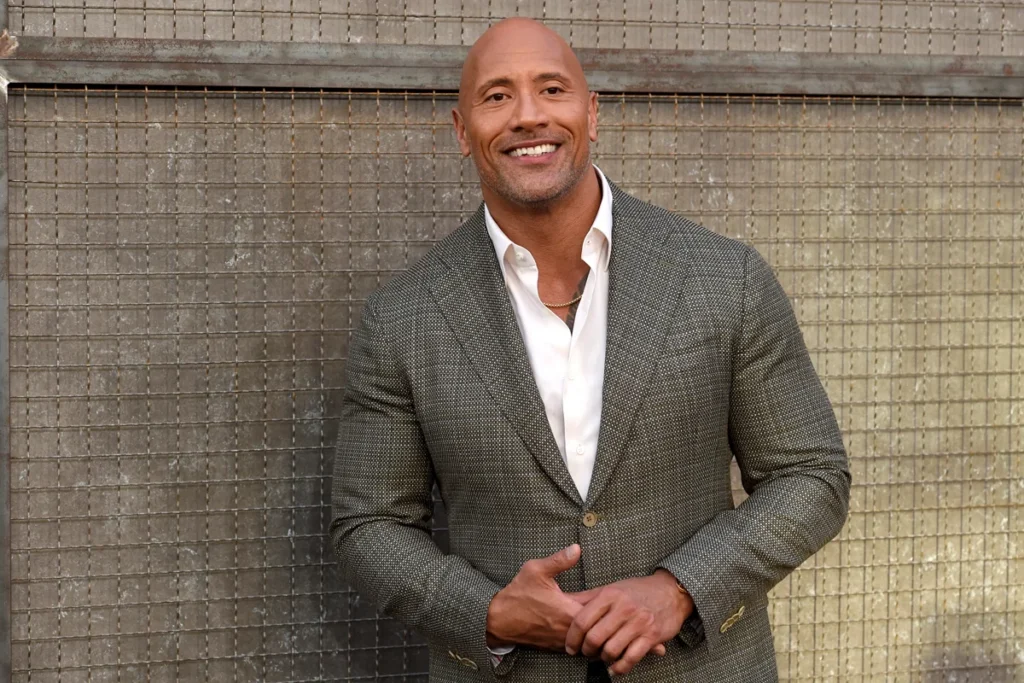Dwayne ‘The Rock’ Johnson: Overcoming Depression and Finding Strength in Faith

Introduction to Dwayne Johnson’s Journey
Dwayne ‘The Rock’ Johnson represents one of the most recognizable figures in contemporary entertainment, known for his extensive career as an actor, producer, and former professional wrestler. Transitioning from the squared circle of WWE to the cinematic realm, Johnson has captivated audiences around the world with his electrifying performances and larger-than-life personality. His journey to stardom is marked by impressive films that span various genres, including action, comedy, and family-oriented projects, making him a household name and a beloved figure.
Beyond his professional accomplishments, Dwayne Johnson is often celebrated for his resilient and cheerful public persona. His charisma and charm have endeared him to fans, contributing to his reputation as a role model for many. However, in recent discussions, particularly in a video for the Oprah Winfrey Network, Johnson has bravely opened up about his personal struggles with depression. This revelation contrasts sharply with the image of strength and invincibility that he conveys through his professional endeavors.
Johnson’s willingness to share his mental health challenges serves as a powerful reminder of the complexities that lie beneath the surface of public figures. Despite his achievements and seemingly unshakeable confidence, he acknowledges that he has faced significant hurdles along the way. By highlighting his journey, Johnson not only humanizes himself but also sheds light on the importance of addressing mental health openly. This courage fosters a deeper understanding of the ongoing fight against the stigma surrounding mental illness, encouraging dialogue and support among those who may feel isolated in their experiences.
The Video Revelation
In a candid discussion on the Oprah Winfrey Network, Dwayne ‘The Rock’ Johnson opened up about his personal battle with depression. The video, which has resonated widely with viewers, provides an intimate glimpse into the challenges he faced, offering a platform for others to understand the realities of mental health struggles. Johnson’s context during this revelation stems from his own life experiences, illustrating how even those who appear strong and successful can encounter profound emotional distress.
Throughout the video, Johnson emphasizes the importance of acknowledging one’s mental health challenges. He shares moving anecdotes about feeling isolated and helpless despite achieving professional success; these insights aim not only to normalize discussions around mental health but also to inspire those who may be silently suffering. His honesty about these experiences serves as a critical reminder that vulnerability is not a weakness but a component of strength.
The significance of this conversation is amplified by the wide-reaching platform of the Oprah Winfrey Network. By sharing his truth on such a prominent stage, Johnson is able to reach millions, fostering a broader understanding of mental health issues. The video effectively demonstrates that hope and healing are attainable, even in the darkest of moments. Johnson’s engaging storytelling, coupled with the emotional weight of his revelations, encourages viewers to reflect on their own experiences and emphasizes the essential role of faith in overcoming adversity.
Ultimately, such discussions on high-profile platforms help to destigmatize mental health issues, encouraging open dialogue among fans and viewers, fostering a sense of community and support. Johnson’s message serves as a beacon of hope for many, illustrating the power of resilience and the profound impact of shared experiences in navigating the depths of depression.
Understanding Depression
Depression is a complex mental health condition that can impact individuals across various demographics, regardless of their achievements or outward appearance of success. It is characterized by persistent feelings of sadness, hopelessness, and a lack of interest or pleasure in daily activities. Depression can manifest through a myriad of symptoms, including fatigue, changes in appetite, difficulty concentrating, and insomnia. These symptoms can vary significantly from one individual to another, which often complicates diagnosis and treatment.
Despite the misconceptions that tend to surround mental health, it is crucial to recognize that depression does not discriminate. Individuals such as Dwayne ‘The Rock’ Johnson, who are celebrated for their accomplishments, can also struggle with this condition. The inner turmoil often remains hidden, as societal pressures and the stigma associated with mental health challenges can lead individuals to conceal their feelings. This phenomenon can create an unsettling disconnect between one’s public persona and private experiences.
Moreover, the mental health landscape has evolved significantly over the years, fostering a better understanding of the nuances of depression. The accessibility of resources, combined with advocacy for mental health awareness, has contributed to more open conversations about these struggles. Such dialogues are essential as they affirm that reaching out for help is a sign of strength rather than weakness. The acknowledgment of personal battles can encourage others facing similar issues and promote a culture of support and understanding.
In conclusion, it is essential to foster an environment where discussions about mental health, including concepts of depression, are normalized. Recognizing that even the most successful individuals may fight their battles can serve to educate and inspire those suffering from similar conditions to seek help and prioritize their emotional well-being.
Faith and Resilience
Dwayne ‘The Rock’ Johnson has often shared that his faith in God has been instrumental in navigating his way through life’s challenges, particularly during periods of depression. His personal journey reveals how spirituality can serve as a powerful tool for resilience, providing individuals with a sense of hope and direction. For many, belief in a higher power offers comfort during turbulent times, fostering a mental framework that promotes healing and perseverance.
Faith plays a multifaceted role in mental health, contributing to emotional stability and overall well-being. For those grappling with feelings of despair and loneliness, turning to spiritual practices can provide solace. Prayer, meditation, and reflective practices are often cited as effective coping mechanisms that help individuals reconnect with their inner selves. By focusing on their faith, many find an escape from the overwhelming pressures of life, creating a much-needed respite that can restore emotional balance.
The concept of resilience is closely linked to one’s ability to seek support and inspiration from spiritual beliefs. Individuals like Johnson often highlight how faith encourages them to embrace adversity as an opportunity for growth. This perspective, shaped by spirituality, can imbue one with strength, allowing them to face challenges with renewed vigor. The rituals associated with faith can foster a sense of community and belonging, further enhancing emotional resilience by cultivating connections with others who share similar beliefs and struggles.
Moreover, the guidance derived from faith can provide clarity on one’s purpose and direction, which is particularly beneficial during difficult periods. Many individuals facing mental health issues find that the principles of their faith can inspire them to push through hardships, reinforcing the notion that they are never truly alone. Dwayne Johnson’s story serves as a testament to the profound impact faith can have on overcoming obstacles, illustrating how belief can transform pain into strength.
Advice for Those Struggling
Dwayne ‘The Rock’ Johnson, known not only for his remarkable career in entertainment but also for his openness regarding his mental health struggles, offers valuable insights for individuals grappling with depression. One of the most compelling pieces of advice he provides is the importance of reaching out for help. Johnson emphasizes that acknowledging one’s feelings and seeking support is a vital first step toward healing. Whether it is confiding in a friend, family member, or a support group, opening up about personal struggles can alleviate the burden of isolation.
Another essential aspect of Johnson’s advice is the significance of sharing one’s experiences. He advocates for creating a safe space where individuals feel comfortable discussing their challenges with mental health. This can foster connection and understanding, helping others realize they are not alone in their journey. Sharing personal stories also serves to destigmatize mental health issues, encouraging more people to speak up and seek help.
In addition to personal support, Johnson stresses the importance of professional assistance. He encourages individuals to seek out mental health professionals who can provide expert guidance and therapeutic strategies tailored to their needs. Whether through therapy, counseling, or other forms of treatment, professional help can offer the tools necessary for coping with depression and enhancing emotional resilience.
Moreover, Johnson highlights the value of maintaining hope and understanding that recovery is a process. He advises individuals to be patient with themselves and to recognize small victories in their journey. By committing to their well-being and utilizing the resources available, those struggling with depression can find strength and support, ultimately leading to a more fulfilling life.
The Importance of Open Dialogue
Mental health remains a subject that is often shrouded in stigma, which can prevent individuals from seeking help or engaging in conversations about their struggles. The silence surrounding mental health issues can be detrimental, leading many to suffer in isolation. Dwayne ‘The Rock’ Johnson’s candid discussions about his own experiences with depression serve as a pivotal example of how open dialogue can change societal views on mental health.
By publicly sharing his journey, Johnson not only normalizes the discourse around depression but also broadens the understanding of its complexity. His willingness to express vulnerability encourages others, particularly fans and followers, to confront their own mental health challenges. When prominent figures are transparent about their battles, it cultivates an environment where individuals feel empowered to share their struggles without judgment. This shift towards open conversation can help dismantle the deeply ingrained stereotypes that often surround mental illnesses.
Open dialogue is critical in creating awareness and fostering acceptance. It can lead to increased empathy and understanding, ultimately helping to reduce feelings of isolation that many people experience. Moreover, when these discussions are approached with sensitivity and honesty, they can inspire others to seek help, whether through professional channels or community support. Johnson’s influence highlights the power of storytelling in mental health; by revealing his own vulnerabilities, he provides a powerful narrative that can resonate with many.
Encouraging open conversations around mental health allows individuals to recognize that they are not alone in their struggles. As more people share their experiences, the collective understanding of mental health issues can evolve, paving the way for more supportive systems and resources. Therefore, the importance of engaging in open dialogue cannot be overstated; it is a vital step towards eradicating stigma and promoting mental well-being.
Resources for Mental Health Support
Mental health is an essential component of overall well-being, and numerous resources are available to support individuals grappling with depression. For those seeking immediate help, hotlines can provide confidential assistance. The National Suicide Prevention Lifeline (1-800-273-TALK) is a critical resource in the United States, offering 24/7 support for anyone in emotional distress. Additionally, the Crisis Text Line is accessible by texting “HELLO” to 741741, connecting users with trained counselors for text-based support.
In addition to hotlines, several organizations are dedicated to mental health awareness and support. The National Alliance on Mental Illness (NAMI) offers a wealth of information on mental health conditions, including depression. NAMI provides educational resources, support groups, and a helpline (1-800-950-NAMI) to assist individuals and families affected by mental illness.
The Substance Abuse and Mental Health Services Administration (SAMHSA) maintains a treatment locator tool on their website, which can help individuals find local mental health services, treatment facilities, and support groups tailored to their needs. Furthermore, Mental Health America provides online screening tools to help individuals assess their mental health and obtain relevant resources based on their results.
Faith-based organizations can also serve as a source of encouragement for individuals facing depression. Programs such as Celebrate Recovery provide a supportive community focused on healing through spiritual guidance and fellowship. Many religious institutions offer counseling services as well, creating an additional layer of support for individuals seeking help.
For those unable to access in-person resources, online therapy platforms like BetterHelp and Talkspace connect users with licensed therapists via messaging, video calls, or phone calls. These virtual options can be particularly beneficial for individuals looking for flexibility and confidentiality in their mental health journey.
The Impact of Celebrity Advocacy
The role of celebrities in shaping public perceptions and attitudes cannot be understated, especially regarding sensitive topics like mental health. When high-profile figures like Dwayne ‘The Rock’ Johnson share their personal struggles, they can significantly influence societal dialogues about mental wellness. Johnson, in particular, has positioned himself as a champion of mental health awareness, openly discussing his battle with depression and advocating for the importance of seeking help. This approach has arguably contributed to diminishing the stigma often associated with mental health disorders, allowing individuals to feel more comfortable in sharing their experiences.
Celebrity advocacy can initiate vital conversations that would otherwise remain unaddressed in public forums. Johnson’s candidness about his mental health challenges not only validates the experiences of those suffering but also encourages individuals to be more open about their feelings. This normalization of mental health discussions ensures that the topic receives the attention it deserves. As fans and followers engage with these narratives, they become more informed about the complexities of mental health, fostering a supportive community where individuals can seek help without fear of judgment.
Conclusion and Hope for the Future
Dwayne ‘The Rock’ Johnson has emerged as a significant figure not only in the world of entertainment but also as a beacon of hope for those grappling with depression and mental health challenges. Through his candid discussions about personal struggles, Johnson emphasizes the importance of resilience and the courage required to confront one’s mental health issues. His journey reflects a powerful narrative; while the path through depression can be incredibly daunting, it also presents an opportunity for growth and empowerment.
One of the key messages that resonate from Johnson’s experience is the necessity of support systems. He advocates for the importance of talking openly about one’s feelings and seeking help from friends, family, or professionals. Johnson’s example illustrates that no one needs to face their battles in isolation; the strength of a supportive network can be transformative in the process of healing. Sharing one’s struggles not only helps in managing personal challenges but can also serve as an inspiration for others who might be experiencing similar feelings.
Johnson also highlights the role of faith in his life, reflecting on how his beliefs have provided him with comfort and guidance. This aspect of his journey suggests that for many, spirituality can offer a sense of purpose and a grounding force in times of turmoil. Regardless of personal beliefs, finding that anchor can play a critical role in recovery from depression.
In conclusion, Dwayne Johnson’s narrative is a profound reminder that though the fight against depression is arduous, it is surmountable with faith, support, and relentless perseverance. His journey encourages individuals to embrace their struggles, seek help, and foster a spirit of resilience, paving the way for a brighter future filled with hope and strength.













Leave a Reply
You must be logged in to post a comment.